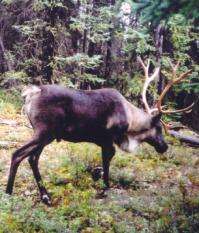First ever worldwide census of caribou and reindeer reveals a dramatic decline

(PhysOrg.com) -- Caribou and reindeer numbers worldwide have plunged almost 60 per cent in the last three decades.
The dramatic revelation, published recently in the journal Global Change Biology, came out of the first-ever comprehensive census carried out by biologists at the University of Alberta.
Study co-author and PhD student Liv Vors says global warming and industrial development are responsible for driving this dramatic decline in caribou and reindeer numbers around the world.
"With Peary caribou on Canada's high arctic islands, for example, there were probably at least 50,000 of them 60 years ago; now there are fewer than 1,000," said Vors.
An earlier spring green-up, which is especially important for pregnant females who need this highly nutritious flush of growth to provide high-quality milk for their newborns, seems to be wreaking havoc with migrating caribou and reindeer.
"Now that spring arrives earlier in the Arctic than it used to, the plants may be past their prime by the time the caribou reach the calving grounds," said Vors. "They don't appear to have adjusted their timing of migration."
Vors says more freezing rain during the winter months force a layer of ice on the ground, which restricts access to lichen and other forage, forcing migrating animals to travel further to find food. During the summer, an increased insect presence interrupts feeding patterns.
"Caribou and reindeer that are harassed by biting and parasitic insects spend less time feeding and more time running around to shake off these pests," she said. "Less feeding equals less body fat, which is crucial to surviving winter."
Hunting likely played a role in the decline of non-migratory woodland caribou in the early part of the 20th century when new roads gave greater access into the boreal forest and small groups of woodland caribou were frequently shot on site. Vors says, though, that it is no longer legal for non-Aboriginal hunters to hunt woodland caribou. For Aboriginal populations who are dependent on caribou and reindeer for sustenance, the decline of caribou is leading to both economic and spiritual hardships.
"If people cannot hunt caribou, they must purchase meat, which is prohibitively expensive in the Arctic," said Vors. "Caribou and reindeer also play significant roles in northern spirituality and mythology. Some values that caribou and reindeer sustain include education in traditional ways of life, kinship and bonding through hunting caribou and reindeer and the bequest of these herds to future generations."
Provided by University of Alberta (news : web)


















